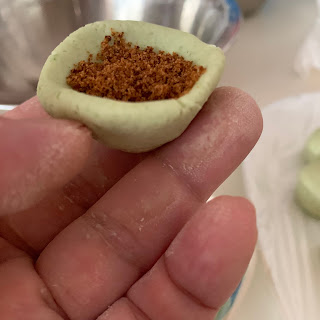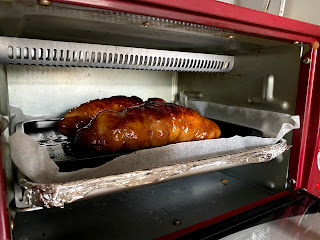It was my family's tradition to prepare and eat glutinous rice ball in pandan sweet soup on Winter Solstice day. My mother used to prepare white and pink plain glutinous rice balls in sweet pandan soup with some gingko nuts. To be frank, the dessert was very appealing in vision, but plain in taste.
Now, as I am in charge of preparing the dessert, I can decide the type of glutinous rice ball soup to offer to my family. Borrowing the idea from ondeh-ondeh, I prepared the glutinous rice ball in pandan flavour, filled with melted palm sugar, and served in thick sweet coconut milk.
I noticed glutinous rice balls have a more chewy texture when serve cold. So, I waited for the glutinous rice balls to cool in icy water, before serving in warm coconut milk 😋
Update: 28 February 2021
I learned from a TV program featuring a famous ondeh-ondeh seller using pellet form of palm sugar instead of loose form. So, I followed and found it easier and less messy to wrap the glutinous rice balls. And the glutinous rice balls also would not over inflate due to presence of less air in the filling. Never try learning and exploring😊
Serving: 3~4 persons
Pandan Glutinous Rice Ball (18 pcs)
Ingredients
90g glutinous rice flour
10g tapioca starch/glutinous rice flour *
5g caster sugar
25g boiling water
25g pandan paste Details in Step 1
30~40g warm water ( to be added during kneading)
Filling
20~40g^ palm sugar/gula melaka granules
* tapioca starch gives a better chewy texture to the rice ball, but it is okay to replace by an equal amount of glutinous rice flour. ^ by compacting the palm sugar, you can increase the filling quantity.Sweet Coconut Milk
100g water
1 blade pandan leaf
15g condensed milk
10g caster sugar
65ml coconut milk
1/8 tsp low-sodium salt
3g glutinous rice flour mix with
25g water as thickener
Directions
1. Cut 20g of pandan leaves into thin strips before blending with 50g of water into a smooth paste.
Collect 25g of the pandan paste for use.
2. Mix glutinous rice flour, tapioca starch and caster sugar in a mixing bowl.
Dig a well in the center of the flour mixture, and pour about 25g of boiling water into it. Cover with a lid, and let it rest for about 5 minutes without stirring the mixture.
3. After the 5-minute wait, stir the mixture,
and pour the 25g of pandan mixture in. Stir to mix.
Gradually add the 30~40g of warm water into the mixture.
Once the mixture becomes crumbly, stop adding water, and knead those crumbs together into a dough.
Knead the dough and continue to add water slowly depending on the dough condition. Try not to keep the dough too wet, as the rice ball will become soggy after cooking.
The dough should become smooth and no crumb will fall off the dough during kneading. To test, take a small piece of dough and roll it into a ball. The ball should be smooth without any crack line.
Cover the dough with a lid, and let it rest for about 30 minutes.
4. While waiting, prepare the sweet coconut milk.
Boil 100g of water with pandan leaf till fragrant.
Dissolve condensed milk into the hot pandan water.
Add 10g of sugar to the hot mixture.
When the mixture beginning to boil, pour in the coconut milk and stir.
Add in pinch of salt to taste.
When the mixture starting to boil again, stir in the glutinous rice water to thicken the mixture.
Transfer the sweet coconut milk to a glass beaker and keep warm in a rice cooker till needed.
5. Divide the dough into about 18 portions, each weighing about 10g.
Shape the dough into a shallow bowl.
Hold about 1g palm sugar granules in the dough,
wrap up the dough,
compress the dough ball using your palm to ensure no point of weakness can be found on the dough surface. This is to avoid the melted palm sugar from leaking out during cooking.
Roll the dough into a smooth ball.
Place the shaped rice balls on a plate without touching each other.
Alternative: by spraying some mist over the palm sugar (slightly moistened), and compact them into a 2g pellet before wrapping up in the glutinous rice dough.
6. Start to boil some water in the pot before shaping the dough. So, when you finish shaping all the rice balls, the water should be boiling.
Drop the rice balls into the boiling water gently. Stir the water occasionally to avoid the rice balls from sticking to the base of the pot.
Cover the lid and let the content simmer. Do not let the water boil vigorously as the rice balls may rupture.
When the rice balls are cooked, they will float to the surface. Let them simmer for another 5 minutes, to ensure the palm sugar melts thoroughly.
Transfer the cooked rice balls to a bowl of ice water to cool down.
7. Dry the glutinous rice balls before pouring the warm sweet coconut milk over before serving. Enjoy 😋









































































